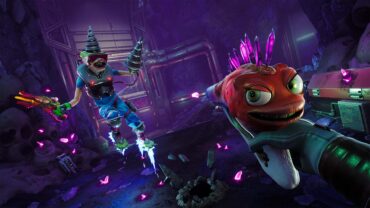While it may not have ever been as big as Mario vs. Sonic or Street Fighter vs. Mortal Kombat, one of the battles that brewed during the earlier days of gaming was Square’s Final Fantasy vs. Enix Corporation’s Dragon Quest. Though the rivalry began on pretty similar terms—both were fantasy-based RPG franchises that sprung up in an era when developers were still trying to figure out what console RPGs were even supposed to be in the first place—time would see the two separate into opposing ideas: “serious” versus “lighthearted”.
My loyalty lay with Final Fantasy. It wasn’t that I disliked Dragon Quest or anything—heck, the original Dragon Warrior (our localization of Dragon Quest) was one of the first RPGs I ever played. Over time, I’ve gone back to Dragon Quest here or there, and while I’ve come to appreciate and respect what Yuji Horii and team have done with the series across those 30-plus years, I’ve always kind of been waiting for the one chapter that would really win my heart.
Although it hasn’t convinced me to jump to the other side of the fandom fence, Dragon Quest XI definitely won me over in my time with it. Part of the reason is the game’s visuals, and while that might seem like an odd place to start when listing the virtues of an expansive, epic RPG, it’s an element of the experience that has been building to this day since 1986.
One of the trademarks of Dragon Quest right from its original chapter has been a collaboration with legendary Japanese artist Akira Toriyama, best known as the creator of Dragon Ball. Of course, the 8-bit era couldn’t even come close to representing his art style in digital form, and while later games have gotten closer to bringing his designs to life, they’ve still been lacking. Dragon Quest XI, however, is incredibly impressive in this regard. While we saw very decent translations of Toriyama’s work in the Dragon Quest Heroes games, DQXI is on a whole other level. Both teammates and NPCs now look almost exactly as we once had to imagine them, but it’s the roster of enemies where the game’s graphical prowess really shines. I’ve never completely been a fan of Dragon Quest’s sillier take on monsters—and I’m admittedly still not—but there’s no denying how they come to life here in a way many RPGs never accomplish.
A pretty face alone does not an RPG make, so thankfully there’s some great gameplay to back up those visuals. What I find really interesting about Dragon Quest XI is that, at the core level, it’s not really doing anything we haven’t seen countless times before. A young hero finds out that they’re the chosen one, sets off on an adventure, and collects a team of ragtag fighters as they inch closer to the inevitable encounter with the looming evil. Sometimes, in fact, the game falls into ridiculously repetitive patterns, such as: visit a town, learn of some local threat, head off to a dungeon to solve the problem, meet the thankful citizens so they can give you an item or open a path, head off to the next town, rinse and repeat.
And yet, it works. Dragon Quest XI feels like years and years of polishing of classic RPG ideas—because, really, it is—and there’s something both enjoyable and comforting in that, even if you sometimes have those repetitive loops. The game reminded me that not everything has to be realtime combo-based battle systems or MMORPG-level world building or fancy Hollywood-quality CG cutscenes. Battles here shouldn’t be as fun as they are for how simple they are on a technical level, and yet I never got tired of them, showing that less really is sometimes more. DQXI’s world is neither fully open world nor completely linear, instead existing somewhere in between, making each area feel expansive and interesting to explore while also never causing stress over where you should be going next. I even enjoyed the item crafting here, thanks to a mixture of always finding new recipes and being able to not only craft worthwhile equipment but also improve even the store-bought stuff.
That’s not to say that everything about Dragon Quest XI feels out of sync with the times, however. While I know it’s not new, as it first made an appearance in Dragon Quest IX, I still really appreciate the “conversation identifier” system that the team at Square Enix has come up with. Every NPC in the game (outside of shopkeepers and the like) has a color-coded speech bubble above their heads: grey means they have no dialog beyond what automatically pops up when walking past them, blue means they’ll have something more (but not critical) to say if you initiate a conversation, pink means they’ll give you a hint as to where to direct your focus for advancing the story, and purple means they’re a quest giver. Speaking of quests, DQXI does the unthinkable in only offering up a small selection of side quests to undertake across a playtime that can hit the triple digits. With how often so many other such games inundate you with people asking you to find something, bring them something, kill something, or whatever else, having such a small possible lists of quests here actually makes each one feel more important and valuable—again going back to that “less is more” idea. There are a few times when the game swings way too far to the other side of the progress scale, such as how you can end up in random battles without any visual warning when travelling by boat, which violates both the game’s own rules and basic common sense. Thankfully, these elements do little to harm the overall game. Well, save one—but we’re going to get there shortly.
The true secret to Dragon Quest XI’s success for me is an element that I never expected to love going in: its characters. I’ve never really felt much for the supporting casts of past Dragon Quest titles, but DQXI might be up there with Persona 5 for my favorite RPG teammates of this generation. Each fits nearly perfectly into long-established Japanese RPG tropes, but through their actions, personalities, or quirks rise up to become something more. Credit for that must be given in part to the game’s localization and new-for-the-West voice acting. While a few of the localization decisions can be a little grating—I was thankful to leave the haiku-spewing village as soon as I was able—whether written or spoken, both story and dialog are wonderfully presented.
I think there’s no better sign to how well the support characters work than the “entertainer extraordinaire” Sylvando. The moment I met him, I feared for the worse, as he instantly comes across as yet another example of Japan’s embarrassing “wacky homosexual” stereotype. Japan’s handling of LGBT issues and characters can be incredibly disappointing, and we’ve seen plenty of examples of that over the years just in video games alone. However, while Sylvando gives every warning sign at first of where the character might be going, his path actually takes him in a far different direction. Sylvando can indeed be effeminate, and campy, and seeming like a blatant stereotype, but every time I worried he might cross that fine line, he never did. While he definitely is those things, he’s also powerful, and resourceful, and respected, and goddamned awesome. The rest of the cast never treats him in the ways that you expect (or fear), and if I was concerned with him as a cast addition five minutes after his introduction, I was already in love with him after 10. (Although, to be fair, it’s entirely possible that questionable aspects of Sylvando’s personality may have been softened in the Western localization.) I mean, my two favorite party members were the flamboyant is-or-isn’t-he-gay jester and the pint-sized child magic user—two of the character types I typically hate with a burning passion. If there was anything to convince me that Dragon Quest XI was doing something right, they were that proof.
And yet, all of this praise I have for what the game is able to do with its cast leads us to the absolute worst character it has to offer: you.
In most cases, silent protagonists are a sham, no matter how many people will accuse me of being a moron for saying that. The idea behind the silent protagonist was to give the player a self-insert character, where we—not the development team—could decide who they were, what their story was, what they looked and sounded like, and so on. That’s great, except that hasn’t worked for years as character models have improved and storylines become more complex. The hero of Dragon Quest XI is a young man with a very specific physical appearance, who has parents and a past, and is then adopted by another family, and grows up in a specific village, and has a childhood friend, and even speaks when we see him as a child. There is nothing about this character that is me, not even one singular point that I can relate to him on on a personal level other than our both being human beings. What the development team has given us here is a specific person that exists on the exact same level of predetermination as every one of his teammates. Had I any choice in his existence—even a simple gender selection (like in Dragon Quest IX) or picking what kinds of weapons he can specialize in or even just determining what kind of haircut he has—I could have something to connect with him with. But there’s nothing.
If you look at a game like Dark Souls, it gives players a silent protagonist that can be customized in a wide variety of ways to make them feel like they’re the player’s character. On the other side of that is something like Final Fantasy XV, where in Noctis we get a fully predetermined character with a voice and personality and involvement in the happenings around him. I’m sick of these wishy-washy in-betweens, especially when the middle point between those two choices is something like Mass Effect’s Commander Shepard, not this.
Why am I harping so hard on this one element of the game? Because the decisions that were made for our main character in Dragon Quest XI actively hurt the story it tells. In scene after scene, the narrative happens around the hero, or to the hero, but never with the hero. As your teammates talk about what to do next, there you are, standing there silent with a dumb expressionless look on your face. As your crew faces off against a terrifying boss and Erik or Jade passionately tell them they’ll never win, there’s your big dumb expressionless silent face maybe going so far as to give an utterly threatening nod. As—in the scene that most broke me in this regard—a character pours their heart out over a lost loved one, giving them absolutely no comfort or encouragement is your big dumb expressionless silent face. And before you say that DQXI is a more light-hearted, younger-audience RPG romp that never takes itself too seriously, so the character can just be a personality-less avatar? The problem is it is but it isn’t. The adventure is definitely all of those things at times, but then in others it gets incredibly dramatic, and serious, and mature on a really touching level. You simply can’t have it both ways—you can’t ask the player to become emotionally engrossed in a story while also giving them a vehicle for exploring said story that is themselves so utterly detached emotionally.
As much as I despise its main character, I want to be very clear: His failure does not irrevocably harm all of the other good that Dragon Quest XI has to offer. Once you’ve come to terms that the main character of the story might as well be Rab, or Veronica, or any other of your teammates depending on the current situation, it’s possible to set that failure aside and go back to appreciating what the game does get right. This is an engrossing story, powered by a fantastic supporting cast, build upon some tried-but-true gameplay. It can be easy sometimes to look at “simpler” RPGs and feel like they don’t have a place anymore in today’s gaming landscape, but Dragon Quest XI goes a long way to remind us that we all need a dose of colorful, cartoony charm every now and then.
|
★★★★☆
Dragon Quest XI brings the legendary Japanese RPG franchise to consoles (properly) for the first time in 13 years, and it’s a mostly fantastic new chapter of the series. Its story, gameplay, characters, and visuals all work to blend timeless series elements with newer-era genre refinements, and most of the time, the results are great. Unfortunately, there are a few times when honoring tradition is a weakness, not a strength—most specifically in the case of the game’s protagonist. |
Developer Square Enix Publisher Square Enix ESRB T – Teen Release Date 09.04.2018 |
| Dragon Quest XI: Echoes of an Elusive Age is available on PlayStation 4 and PC. Primary version played was for PlayStation 4. Product was provided by Square Enix for the benefit of this coverage. EGM reviews on a scale of one to five stars. | |

Mollie got her start in games media via the crazy world of gaming fanzines, and now works at EGM with the goal of covering all of the weird Japanese and niche releases that nobody else on staff cares about. She’s active in the gaming community on a personal level, and an outspoken voice on topics such as equality in gaming, consumer rights, and good UI. Check her out on Twitter and Mastodon.





